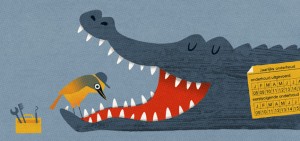Openness and trust in offshore relationshipsOpenheid en vertrouwen in offshore relatiesÖppenhet och förtroende i offshorerelationerOffenheit und Vertrauen in Offshore Beziehungen
 I am reading a book called ‘100% succesvolle IT-projecten’, written by Klaas Jung and Gerard van de Looi. They write about the key success factors in IT projects. One of the chapters that stand out for me is about relationships and openness. They write:
I am reading a book called ‘100% succesvolle IT-projecten’, written by Klaas Jung and Gerard van de Looi. They write about the key success factors in IT projects. One of the chapters that stand out for me is about relationships and openness. They write:
‘The more you open up for the other person, the bigger the chances that you receive trust. The contradiction is that people often get more closed, because they are afraid to be punished for being open.
Ik ben een boek aan het lezen genaamd ‘100% succesvolle IT-projecten’, geschreven door Klaas Jung en Gerard van de Looi. Ze schrijven over de belangrijkste succesfactoren in IT projecten. Een van de hoofdstukken die er voor mij bovenuit steekt is die over relaties en openheid. Ze schrijven:
‘Hoe opener je bent naar de ander, hoe groter de kans dat je vertrouwen creert. De tegenstrijdigheid is dat mensen vaak juist meer gesloten worden omdat ze bang zijn dat ze gestraft worden voor openheid.
Jag läser just nu en bok som heter ”100% succesvolle IT-projecten” skriven av Klaas Jung och Gerard van de Looi. De skriver om de olika framgångsfaktorerna i IT-projekt. Ett av de kapitlen som utmärker sig är det om relationer och öppenhet, där de skriver:
 Ich lese ein Buch namens „100% successvolle IT-Projekten“ (100% erfolgreiche IT-Projekte) geschrieben von Klaas Jung und Gerald von de Looi. Sie schreiben über die Schlüsselfaktoren in IT-Projekten. Eines der Kapitel, das für mich besonders heraus stach, handelt von Beziehungen und Offenheit. Sie schreiben:
Ich lese ein Buch namens „100% successvolle IT-Projekten“ (100% erfolgreiche IT-Projekte) geschrieben von Klaas Jung und Gerald von de Looi. Sie schreiben über die Schlüsselfaktoren in IT-Projekten. Eines der Kapitel, das für mich besonders heraus stach, handelt von Beziehungen und Offenheit. Sie schreiben:
“Je mehr Sie offen gegenüber einer anderen Person sind, desto größer ist die Chance, dass sie Vertrauen erhalten. In an atmosphere of mutual trust, you can be open, you can discuss problems and you solve problems quickly together. But when we are not open and keep problems for ourselves, the other starts mistrusting us. In turn, the other will also react more closed and we create distance.’
In relationships that cross borders, cultures and language, I believe the challenge for making IT projects work well, depends on being open even more than in local projects. Openness differs between cultures. Unless we learn how open another person from another culture is and expects us to be, communication will get blocked and trust is low. The goal in an offshore relationship is to work together comfortably and as we already have distance in culture, language and geography, we need to decrease the personal distance.
The authors describe what factors contribute to an equal relationship on which trust and communication can be built.
1. Respect: If one person has less respect for the other person, the relationship will grow distant. If one person will be obedient to the other person, this can lead to suppression. This is often based on the idea of the customer ‘we pay the invoices so you have to do as we say’. If both sides have respect for each other, the relationship will be equal and will work well on longer term. The perception of respect varies strongly across cultures, so we need to explore how the other person perceives us and respect for other people in general.
2. Forgiveness: In all projects, people make mistakes. We need to learn from mistakes to get better. If one person doesn’t forgive the other for his mistakes, the relationship will break eventually. Culture plays a big role here. In cultures where hierarchy is important, the relationship between boss and employee or customer and supplier tends to be different from cultures with less power-distance.
3. Maintenance: In all human relationships, we need to invest energy in keeping the relationship healthy. In an IT project, it is important to invest in the relationship not only in the offer-phase, but during the whole project. With people being remote from each other, the challenge here is even bigger as we have less frequent (face to face) encounters.
4. Fear of conflicts: In an equal relationship, all topics (positive and negative) can be openly discussed. People can then openly share problems, without being afraid of a conflict. People from different cultures tend to have a different attitude towards conflict. In order to make the relationship strong, we need to be open and we need to explore from both ‘sides’ to what degree we can or cannot create conflict with the other person.




Interessant artikel en boek. Belangrijk is na de constatering dan ook, hoe ga je hier mee om? Hoe kom je van een constatering, een buikgevoel, naar een echte verandering in de relatie.
Medewerkers die een belangrijke rol, een bepalende rol, spelen in een offshore relatie spelen worden ook beinvloed door de ‘buitenwereld’. En dat hoort ook bij de Openness in de relatie. Deel die ‘aansturingen’ van buiten ook met elkaar. En werk dan aan de verandering bij je zelf.